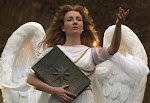 Amanda Seyfried has become a household name since her lead role in Mamma Mia! Before, Seyfried starred as a supporting actress in the not-so-complicated (but hilarious) Mean Girls and then moved to more heated material with HBO's polygamist drama series Big Love. Now, Seyfried stars in her riskiest role to date as an erotic seductress in Chloe. In the film, Chloe (Seyfried) is hired by gynecologist Catherine Steward (Julianne Moore) to uncover her suspicion that her husband, David (Liam Neeson), is cheating.
Amanda Seyfried has become a household name since her lead role in Mamma Mia! Before, Seyfried starred as a supporting actress in the not-so-complicated (but hilarious) Mean Girls and then moved to more heated material with HBO's polygamist drama series Big Love. Now, Seyfried stars in her riskiest role to date as an erotic seductress in Chloe. In the film, Chloe (Seyfried) is hired by gynecologist Catherine Steward (Julianne Moore) to uncover her suspicion that her husband, David (Liam Neeson), is cheating.The highest rating Chloe has received at Rotten Tomatoes is 69% (convenient, considering the explicit sexuality of the film), a rating with which I wholeheartedly disagree. The film has its scenes that just don't work (many of which consist of Catherine's son), a few cliches (as Ebert puts it, a house out of Architectural Digest), but the film has two incredible female lead performances from Seyfried and, of course, Moore.
One of Cinematical writer Monika Bartyzel's distinct complaints about the film is the performances, stating:
The perofrmances seem fine, but removed... this is an erotic thriller, and if you can't feel that attraction, that need, that at-all-odds desire, it won't unfold and grab you as it should.
Her definition of the performances need in an erotic thriller are accurate, however, her perception of these performances is something I disdain. Chloe is a character to which you must feel a certain ambiguity towards; her motives appear ambivalent. You believe, at first, that Chloe is simply doing her job. But you then begin to question her motives: is she trying to help Catherine? Is she interested in Catherine's husband? Catherine's son? Seyfried has stated in interviews that her research for this role consisted of lengthy discussions with its director, Atom Egoyan, and I believe these interviews created an incredible execution of the character. Every move, every word is spoken with accuracy and seduction because, as Chloe says in the opening lines of the film, she's always been good with words.
There is always at least one sentence (if not the whole article) in New York Times critic A.O. Scott's reviews that I find inaccurate. Scott's review can be summarized by one line near the end of his article:
The heavy-breathing soft-core action, accompanied by Mychael Danna’s engorged musical score, is not itself objectionable, but it lacks any real dramatic vitality or emotional charge.
Mr. Scott's ignorance pollutes my perception of the film. The "soft-core" action that Scott describes is always accompanied by Danna's score, both of which I found incredibly emotional. The intimacy between Chloe and David cannot just be described as sexual but incredibly emotional because it always refers back to Catherine. There are two scenes where Chloe and David are intimate, and the emotional charge is so effective because it is inter-cut with Catherine's reactions. Even when Chloe describes the intimate relationships between herself and David, the descriptions are jarring because of the effect they have on Catherine.
For me, the most important quality of a film are its performances. There are films, such as Precious or even Julie & Julia, where a screenplay is not as strong as it could be. But strong female performances (from Mo'Nique and Streep) can make a film so much stronger. With Chloe, we are met with the strongest performance by Amanda Seyfried to date. Her character is so complex and her perception and delivery are spot on. The conversations between Seyfried and Moore are so raw and effective - both actresses are on par and have an intense chemistry.
Other strong aspects of the film include its score and cinematography. A.O. Scott may describe Mychael Danna's score as "engorged," but I would say the opposite. Half of the score was appropriately subtle throughout the film. There is a constant theme of guitar strings that represent Chloe's intimate presence in a scene. For me, these pieces are the strongest of the entire score. The cinematography, Cinematical agrees, is stunning. Paul Sarossy creates a visual character throughout the film. In one scene, cross-cutting between Chloe's and David's erotic meet-up and Catherine in the shower, Sarossy presents his strongest abilities as cinematographer.The beauty of the camera movement and framing of the shots communicate incredible symbolism and foreshadowing.
The movie's storyline and subject matter is so complex and interesting; screenwriter Erin Cressida Wilson has done an incredible job handling such complicated material. Although there are some scenes where the dialogue is stiff, the film keeps you constantly questioning the motives of Chloe, even when the end credits begin to role. There is always a question of "Will this film be good?" as one takes their seat in the audience. Sometimes a movie that leaves you questioning is a movie that answers your first question. Yes, Chloe is strong in many aspects, and I cannot get it out of my head.
